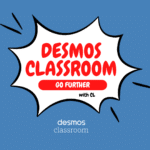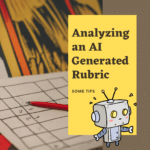Guest Post by Rachelle Dene Poth
Focus on Computer Science
Barriers to bringing coding into the classroom
For some educators, topics like coding and computational thinking can seem challenging to bring into the classroom. Whether due to a lack of resources, not knowing where to begin, or not having confidence in teaching students about these topics, opportunities are sometimes missed. It has been reported that the United States will need to fill 3.5 million STEM jobs by 2025, which means we need to find ways to bring more opportunities into our classrooms. Fortunately, there are some great resources full of lessons and for different age groups to get started. I recently signed up for a 30 day trial of Rex Academy and we are exploring Python and cybersecurity to start.
Another barrier was my own hesitancy to start bringing coding into my classes.
[tweet]I thought that these topics were not relevant to my role as a Spanish teacher. It was an area that intimidated me because I believed it to be so complex, but it does not have to be.[tweet]
We need to find ways to give our students and ourselves an opportunity to learn about topics like coding and computational thinking and how they apply in our daily lives and how it could possibly benefit us in the future.
Where to Begin – 5 Resources to Bring Coding Into the Classroom
There are so many resources out there that sometimes knowing exactly where to start presents the challenge. It is easy to get started by referring to the Code.org site or checking out CS First from Google and resources for educators. Here are five additional resources to bring coding into the classroom. Explore the activities or curriculum offered, or take advantage of the trial for platforms like Rex Academy, especially at the end of the year when looking for new ideas.
1. Blackbird Code
Blackbird Code now offers a middle school curriculum and it is great for students and even teachers to build coding skills at their own pace. It allows for differentiation and enrichment through the workshops and built-in supports available. There are ten stages with lessons for each stage.
2. CodeCombat
A game based computer program for older students who want to learn about coding with Javascript or Python. What makes this one a favorite for students is that when they type in their code, they see their characters respond in real-time.
3. Khan Academy Code
For grades six and up students can watch an interactive talk-through, work through challenges or decide to do their own project. Everything that students need for coding is available directly through the website. Students can also learn to code by making a website in HTML tags and CSS.
4. Kodable
Offers some free activities for students in grades two through five, and Javascript for students in upper elementary grades. Activities are available for social studies, science, ELA, math and more for beginning to advanced levels.
5. Microsoft
Offers several resources available for free for educators to choose to bring STEM curriculum into the classroom. Some of the options include Minecraft education (Coding with Minecraft), Make Code, and Hacking STEM.
6. Tynker
Tynker offers a lot of activities for students to participate in and learn about coding. Activities are grouped for students in the varying age ranges and options include text coding, STEM activities, and the UN+ which focuses on ecological issues such as affordable and clean energy, life on land, and responsible consumption.
Explore and Learn With Your Students
My best advice is to try each of these with your students, explore and continue learning right along with and from your students! I enjoy working through the sites that offer a trial to see what it could look like as students work on their own through each lesson.
About The Author
Rachelle Dene Poth is an edtech consultant, presenter, attorney, author, and teacher. Rachelle teaches Spanish and STEAM: What’s nExT in Emerging Technology at Riverview High School in Oakmont, PA. Rachelle has a Juris Doctor degree from Duquesne University School of Law and a Master’s in Instructional Technology. She is a Consultant and Speaker, owner of ThriveinEDU LLC Consulting. She is an ISTE Certified Educator and currently serves as the past-president of the ISTE Teacher Education Network and on the Leadership team of the Mobile Learning Network. At ISTE19, she received the Making IT Happen Award and has received several Presidential Gold Awards for volunteer service to education.
Rachelle is the author of six books, ‘In Other Words: Quotes That Push Our Thinking,” “Unconventional Ways to Thrive in EDU” (EduMatch) and “The Future is Now: Looking Back to Move Ahead,” “Chart A New Course: A Guide to Teaching Essential Skills for Tomorrow’s World” and her newest book, “True Story Lessons That One Kid Taught Us.” Her newest book will be available this summer from Routledge, “Your World Language Classroom: Strategies for In-Person and Digital Instruction.”
Rachelle is a blogger for Getting Smart, Defined Learning, District Administration, NEO LMS, and the STEM Informer with Newsweek.
Follow Rachelle on Twitter @Rdene915 and on Instagram @Rdene915. Rachelle has a podcast, ThriveinEDU https://anchor.fm/rdene915. Find these available at bit.ly/Pothbooks








